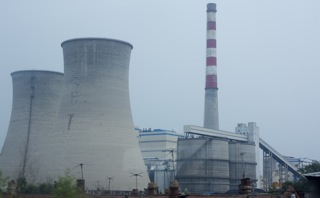
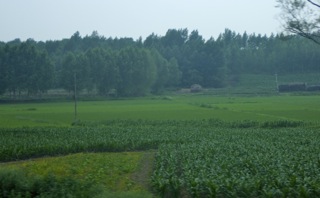
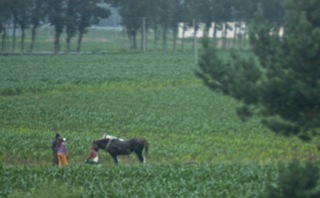
June 25th: We took a train to Mudanjiang, and met our new friends there.We took an afternoon train from Harbin to Mudanjiang (departed at 2:00 p.m. and arrived at 6:50 p.m.). We were amazed to learn that Wei Lue, our host teacher from Mudanjiang Normal College had taken an early morning train that same day from Mudanjiang, and only had a few hours in Harbin before he returned (with us) on the train back from Harbin. As he was from Qiqihaer, and had studied in Harbin, he assured us he was accustomed to the train ride. Still, to spend about 14 hours travelling and in transit just to help meet us and bring us back to his college seemed extraordinary to us. Our earlier train travel in Heilongjiang had been north between Harbin and Bei-An, and that was basically flat, so it was exciting to see more hills, and then even low mountains as we traveled south and east. Mudanjiang is the uttermost eastern large city in China (although Jiamusi and Jixi and Qitaihe may claim to be large cities as well, and they are even further east). but Mudanjiang is bigger than those. It is essentially a border town, although the Russian frontier is over a hundred kilometers to the east. Between Mudanjiang and the Russian village of Pogranichny there are only a few small Chinese villages (such as Suifenhe right on the border). North Korea is not very far away either, being about 250 kilometers south from Mudanjiang. As we travelled along in the train I looked out the windows. The homes and wooden stick fences surrounding domestic yards reminded me very much of the Siberian villages I had watched out train windows for days on the Tran-Siberian back in 1992. A new highway went along near the railroad for much of the distance, and all along the route there were many signs of new construction in cities and towns. Yet, this part of China is not so densely populated, and the rural areas we passed through delighted us with their charming aspects. |
Return to summer diary home page. |
Back to previous diary entry. Forward to next diary entry. |
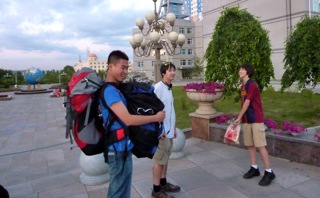 |
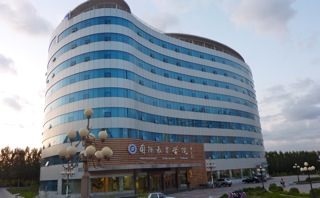 |
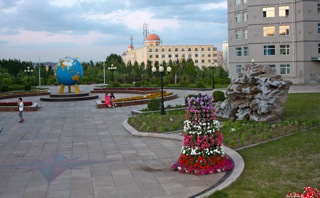 |
||
| Our arrival in Mudanjiang.Michael is carrying our luggage. | This is the building where we lived in Mudanjiang. It was lovely. | Our first view of the campus at Mudanjiang Normal College. |
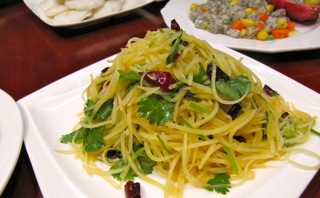 |
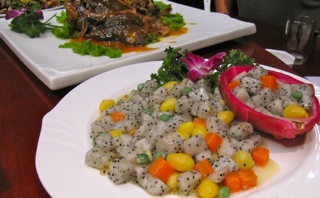 |
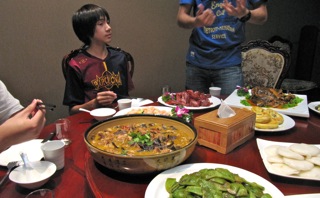 |
||
| In Heilongjiang you will get potato strings. This is a good thing. | Assorted fruits. | Our first dinner in Mudanjiang. Arthur is holding his chopsticks pretty well. |
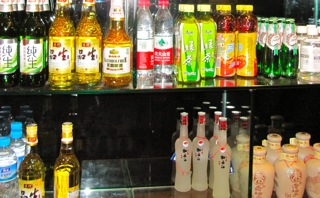 |
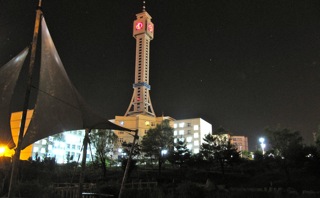 |
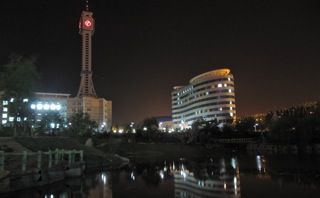 |
||
| Drinks available in our building. An assortment of beer, water, tea, and juice-drinks. | A view during an evening stroll. | The stars could be seen behind our building and the clock tower. |
The arrival in Mudanjiang made a strong impression on us. Two students, Michael and Peter met us at the platform and took our luggage so we would not have to carry it. Wei Lue and these two friendly students brought us along to taxis, which took us swiftly to the campus on the west edge of the city. Peter and Michael had studied our web pages, and knew quite a bit about us, which was impressive. Their English skills were also quite strong, and they spoke fluently. Mudanjiang itself made a good first impression. It was twilight as we arrived, just around seven. The city is ringed by hills, but the city does not extend everywhere right up to the hills, as there are in many places fields or meadows between the edge of the built-up area and the forests of the hills and mountains. The Mudanjiang River flows through the valley, making an eastern and southern border for the central part of the city. From the campus of Mudanjiang Normal College we could look out over the whole valley and see the city. It did not seem nearly as large as Harbin or Beijing, yet Mudanjiang is a large city, with over a 800,000 residents. It seemed very clean—perhaps it was the cleanest city we visited in China (although Dandong was also very tidy). The taxi drivers and traffic in general moved with far more courtesy and order than we had seen in any of the other cities we visited. The Mudanjiang Normal College campus was also quite interesting. It is very new, and the clock tower, just outside our building, was covered with LED lights what displayed a light show for a few hours after dark. On the second floor of our building was a sort of restaurant where we took our our meals while in Mudanjiang. The staff were friendly, and the food was good. Conversation over meals was also entertaining, and we frequently had to remind ourselves to get up and leave so the staff could clear away the dishes and take a break or go home. |
Return to the summer diary home page. | Back to previous diary entry. Forward to next diary entry. |